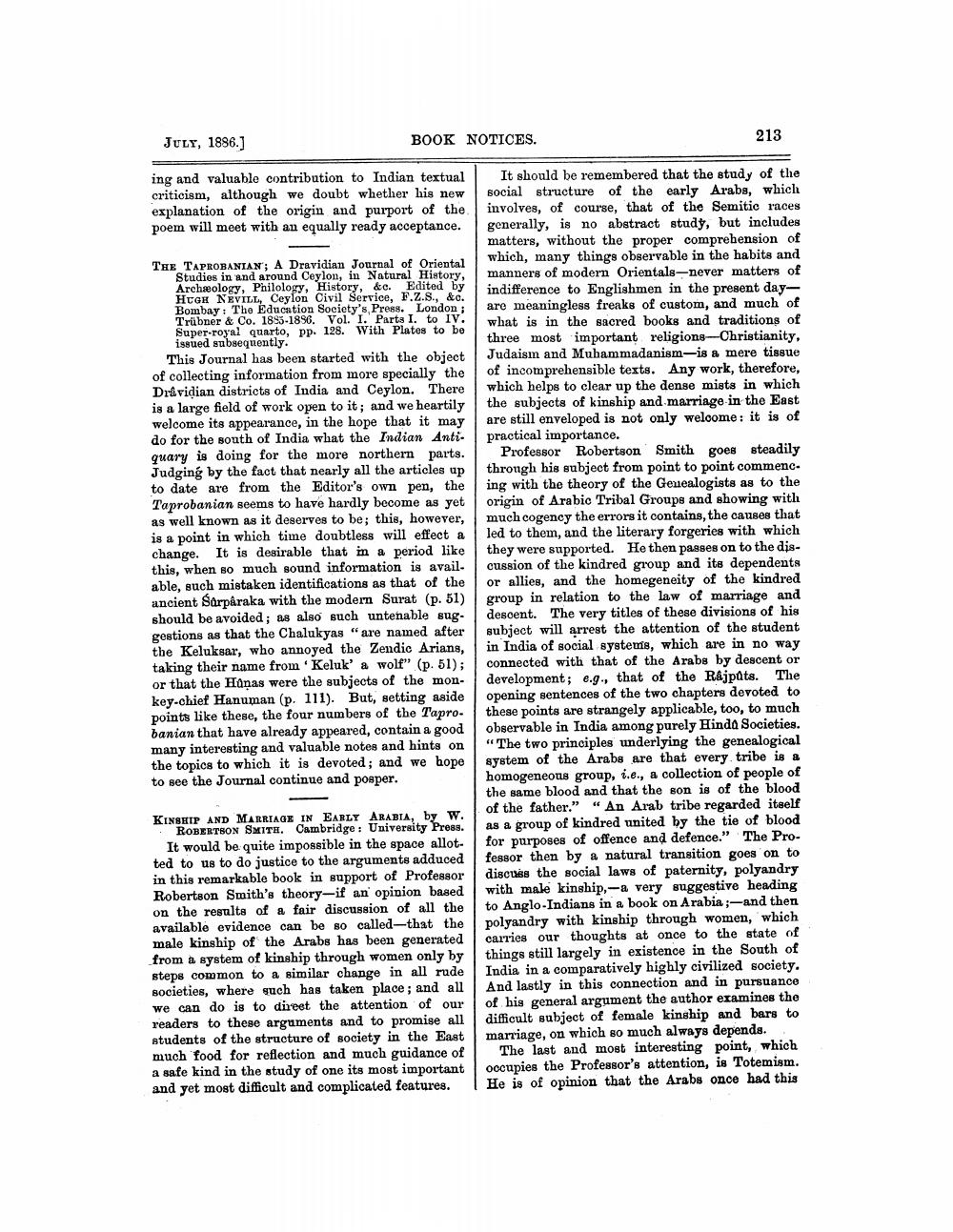________________
JULY, 1886.]
BOOK NOTICES.
213
ing and valuable contribution to Indian textual It should be remembered that the study of the criticism, although we doubt whether his new social structure of the early Arabs, which explanation of the origin and purport of the involves, of course, that of the Semitic races poem will meet with an equally ready acceptance. generally, is no abstract study, but includes
matters, without the proper comprehension of THE TAPROBANIAN; A Dravidian Journal of Oriental
which, many things observable in the habits and Studies in and around Ceylon, in Natural History, manners of modern Orientals-never matters of Archæology, Philology, History, &c. Edited by HCG: NEVILL, Ceylon Civil Service, F.Z.s., &c.
indifference to Englishmen in the present dayBombay: The Education Society's Press. London, are meaningless freaks of custom, and much of Trübner & Co. 1895-1896. Vol. I. Parts I. to IV. Super-royal quarto, pp. 128. With Plates to be
what is in the sacred books and traditions of issued subsequently.
three most important religions-Christianity, This Journal has been started with the object Judaism and Muhammadanism-is a mere tissue of collecting information from more specially the of incomprehensible texts. Any work, therefore, Dravidian districts of India and Ceylon. There which helps to clear up the dense mists in which is a large field of work open to it; and we heartily the subjects of kinship and marriage in the East welcome its appearance, in the hope that it may are still enveloped is not only weloome: it is of do for the south of India what the Indian Anti- practical importance. quary is doing for the more northern parts. Professor Robertson Smith goes steadily Judging by the fact that nearly all the articles up throngh his subject from point to point commenc. to date are from the Editor's own pen, the ing with the theory of the Genealogists as to the Taprobanian seems to have hardly become as yet origin of Arabic Tribal Groups and showing with as well known as it deserves to be; this, however, much cogency the errors it contains, the causes that is a point in which time doubtless will effect a led to them, and the literary forgeries with which change. It is desirable that in a period like they were supported. He then passes on to the disthis, when so much sound information is avail cussion of the kindred group and its dependents able, such mistaken identifications as that of the or allies, and the homegeneity of the kindred ancient Sürparaka with the modern Surat (p. 51) group in relation to the law of marriage and should be avoided; as also such untenable sug- descent. The very titles of these divisions of his gestions as that the Chalukyas "are named after subject will arrest the attention of the student the Keluksar, who annoyed the Zendic Arians, in India of social systems, which are in no way taking their name from 'Keluk' a wolf" (p. 51); connected with that of the Arabs by descent or or that the Haņas were the subjects of the mon- development; e.g., that of the Rajputs. The key-chief Hanuman (p. 111). But, setting aside opening sentences of the two chapters devoted to points like these, the four numbers of the Tapro. these points are strangely applicable, too, to much banian that have already appeared, contain a good observable in India among purely Hinda Societies. many interesting and valuable notes and hints on "The two principles underlying the genealogical the topics to which it is devoted ; and we hope system of the Arabs are that every tribe is a to see the Journal continue and posper.
homogeneous group, i.e., a collection of people of
the same blood and that the son is of the blood KINSHIP AND MARRIAGE IN EARLY ARABIA, by w
of the father." "An Arab tribe regarded itself ROBERTSON SMITH. Cambridge: University Press. as a group of kindred united by the tie of blood It would be quite impossible in the space allot- for purposes of offence and defence." The Proted to us to do justice to the arguments adduced fessor then by & natural transition goes on to in this remarkable book in support of Professor discuss the social laws of paternity, polyandry Robertson Smith's theory-if an opinion based with male kinship,-a very suggestive heading on the results of a fair discussion of all the to Anglo-Indians in a book on Arabia ;-and then available evidence can be so called--that the polyandry with kinship through women, which male kinship of the Arabs has been generated carries our thoughts at once to the state of from a system of kinship through women only by things still largely in existence in the South of steps common to a similar change in all rude India in a comparatively highly civilized society. societies, where such has taken place; and all And lastly in this connection and in pursuance we can do is to direet the attention of our of his general argument the author examines the readers to these arguments and to promise all difficult subject of female kinship and bars to students of the structure of society in the East marriage, on which so much always depends. much food for reflection and much guidance of The last and most interesting point, which a safe kind in the study of one its most important occupies the Professor's attention, is Totemism. and yet most difficult and complicated features. He is of opinion that the Arabs once had this




